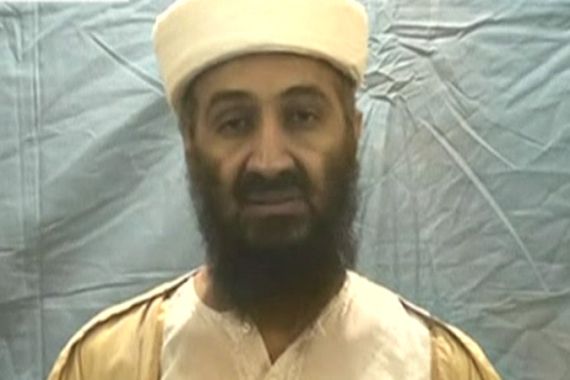Bin Laden files ‘show role’ in al-Qaeda plots
US officials say bin Laden’s journal and captured flash drives reveal he helped plan every recent major threat.

 |
| Before bin Laden was killed in his Pakistani compound, most believed his leadership role had diminished [GALLO/GETTY] |
Despite living in hiding for a decade, al-Qaeda founder Osama bin Laden remained the driving force behind every recent plot conceived by his group, US officials said, citing his private journal and computer files recovered in the raid that led to his death last week.
Bin Laden wrote regularly to al-Qaeda franchises outside of Pakistan, using couriers to deliver small computer flash drives containing his missives, according to the officials, who spoke to the Associated Press news agency on condition of anonymity.
Around 100 drives, five computers and bin Laden’s handwritten journal were taken from his compound in the northern Pakistani city of Abbottabad after Navy SEALs completed their raid, the officials said.
 |
Bin Laden advised al-Qaeda’s scattered franchises to hit smaller cities in the United States, not just New York City, and to target trains in addition to airplanes. He suggested strikes on significant dates and anniversaries, such as July 4, the US independence day, and the approaching 10th anniversary of the September 11 2001 attacks, which first brought al-Qaeda into mainstream knowledge.
Bin Laden emphasised that if al-Qaeda wanted to force the United States to withdraw its troops from the Muslim world – one of the group’s main goals – more Americans needed to die in a single attack.
He concluded that smaller, scattered attacks since September 11 had not been enough and told followers that only a body count of thousands, something on the scale of the attacks on New York and Washington, would shift US policy.
He also schemed about ways to sow political dissent in Washington and play political figures against one another, officials said.
A fading influence
Yet despite bin Laden’s writings, al-Qaeda’s recent actions point to the ailing 54-year-old’s waning importance in the movement he bankrolled and helped to lead.
No evidence found in the investigation of the attempted Christmas Day 2009 bombing of a Detroit-bound airliner or the nearly successful attack on cargo planes heading for Chicago and Philadelphia led to bin Laden, and the officials said they had not yet seen any indication that bin Laden had the ability to co-ordinate timing of attacks across the various al-Qaeda affiliates in Pakistan, Yemen, Algeria, Iraq and Somalia. It is also unclear from the files how much the affiliate groups relied on his guidance.
Britain’s two largest terror attacks and plots – the 2005 suicide bombings and the trans-Atlantic liquid explosive plot to blow up several airliners in 2006 – both had trails that led back to Pakistan and al-Qaeda figures, but there was never a direct link to bin Laden himself.
The movement’s Yemen branch, al-Qaeda in the Arabian Peninsula, has in recent years become the leading fundraising, propaganda and operational arm. It has embraced the smaller-scale attacks that bin Laden’s writings indicate he regarded as unsuccessful.
Most of the recent plots, including the stabbing of a lawmaker last year, have been traced to al-Qaeda in Yemen and specifically the American-born cleric Anwar al-Awlaki, British officials have said. One British official said counter-terror authorities had not been tracking bin Laden like they had other suspects deemed more directly involved in operations.
Leah Farrell, a former senior counter-terrorism analyst with the Australian Federal Police, said that bin Laden’s death was a symbolic victory for the United States and would not impact al-Qaeda’s operations.
Bin Laden “really only got involved in [operations] planning to approve spectacular [attacks], particularly those using a new means of attack or against a new target,” she wrote on her blog. “Second tier leaders deal with external operations for the most part.”
No evidence of new plots
Intelligence officials have not identified any new planned targets or plots in their initial analysis of the 100 or so flash drives and five computers that Navy SEALs hauled away. They said it may take months to analyse all of the files.
Last week, the Federal Bureau of Investigation and Homeland Security Department warned law enforcement officials nationwide to be on alert for possible attacks against trains, though officials said there was no specific plot.
Al-Qaeda has not named bin Laden’s successor, but under the movement’s protocols, his deputy, Ayman al-Zawahari, will automatically assume control for an interim period. The question is whether al-Zawahari, or anyone, can keep all of al-Qaeda’s disparate franchises under any kind of centralised control. The groups in Somalia and Algeria, for instance, have very different goals focused on local grievances.
Without bin Laden to serve as their shepherd, it is possible al-Qaeda will further fragment. British officials said the Americans had shared some information with them about the bin Laden cache, but there had been nothing concrete yet to indicate bin Laden’s stamp on any of the recent attacks or plans in Britain – including a European plot last year involving the threat of a Mumbai-style shooting spree in a capital.
They spoke on condition of anonymity to discuss matters of intelligence.